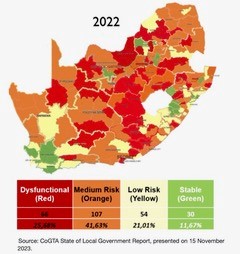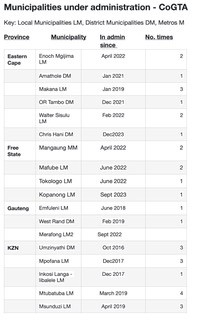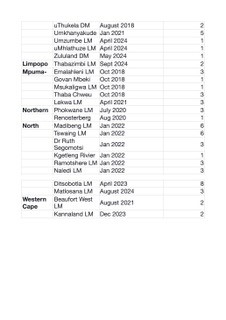Sixteen percent, or 41, of South Africa’s 257 municipalities are officially incapable of fulfilling their obligations and are thus currently under administration, according to Minister of Cooperative Governance and Traditional Affairs (CoGTA) Velenkosini Hlabisa.
BusinessTech reports that this is up from 32 in the previous reporting period.
These details were revealed by Hlabisa in an answer to a recent parliamentary question.
When a municipality does not fulfil its obligations, the provincial and/or national executive can intervene in terms of the Constitution (section 139) to ensure fulfilment of that obligation.
CoGTA’s State of Local Government report, presented to Parliament’s portfolio committee at the end of 2023, noted that only 11.67% of municipalities are ‘stable’ and only 38 of the 257 municipalities receive clean audits.
Just over 25% were defined as ‘dysfunctional’, thereby risking being placed under administration.

BusinessTech reports that CoGTA is concerned about the declining level of service delivery, instability, weakening capacity of municipalities, and the debt owed to municipalities that impinges on their performance.
According to the South African Local Government Association (Salga), the four root causes of the decline are:
- Poor political leadership capacity and weak administrative management;
- Inefficient and non-integrated delivery mechanisms, systems and processes to enable service delivery;
- Ineffective utilisation of financial resources (poor financial administration), inability to collect revenue, and insufficient fiscus allocation;
- Degenerating infrastructure and non-existent or poor services provided to local communities.
At the start of his term as minister, Hlabisa announced that his department was not scared of dissolving dysfunctional municipalities and calling for re-elections, citing corruption, political instability, and poor service delivery as reasons for this focus.
He stressed that waiting idly by until 2026 for new leadership at local government level was not an option.
He called for “bold and radical action” against underperforming municipalities.
Hlabisa emphasised that CoGTA would concentrate on “the pillars of sustainability” to assist distressed municipalities.


[Image: Lemourkhunshy, https://commons.wikimedia.org/w/index.php?curid=131126413]


